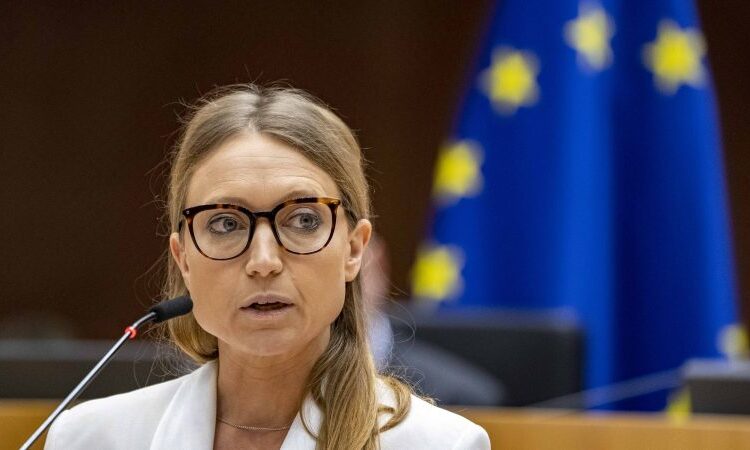
As MEPs picked the leading roles for the new European Parliament’s policy committees on Tuesday (23 July), the influential economic and monetary affairs (Econ) and budgets committees remained firmly in the hands of incumbent parties – the socialists and the hard-right ECR, respectively.
The French Socialist lawmaker Aurore Lalucq was elected at the helm of the Econ committee, taking over from Italian Irene Tinagli, while Belgian MEP Johan Van Overtveldt (ECR) was confirmed for a second term as chair of the Committee on budgets.
Lalucq said Europe’s positioning in international trade and its global competitiveness will take centre stage in the next five years: “This mandate will be, in my opinion, deeply economic and industrial,” she said after the vote this morning.
“I think today we are very attentive to economic and industrial questions, and the place of Europe in global competitiveness.”
What Lalucq and Van Overtveldt stand for
A fiscal and monetary dove, Lalucq is most widely known for her vocal support for an EU-wide wealth tax.
In the past, she has also called on the European Central Bank (ECB) to cancel EU countries’ public debt, arguing that this is necessary to lower the risk of a sovereign debt crisis and give member states more fiscal “room for manoeuvre” to make green investments.
Lalucq is also a strong proponent of integrating Europe’s climate policies with industrial and trade strategies – and has been especially vocal about Europe’s declining competitiveness relative to China and the United States.
“To renounce the Green Deal, to not invest in the ecological transition to green our industry, would be to put the European Union out of the game. It would be vassalising us vis-à-vis China and the United States,” the MEP said in May.
Lalucq also supports the European Commission’s controversial decision to impose preliminary tariffs on electric vehicles produced in China last month and has explicitly stated that Europe is currently locked in a “trade war” with Beijing.
Lalucq recently served as the Parliament’s rapporteur for legislation aimed at ensuring greater transparency and public oversight of environment, social, and governance (ESG) rating agencies.
Meanwhile, on the opposite side of the political spectrum, decisions revolving around the EU budget will continue to be overseen by fiscal hawk Van Overtveldt.
A former Belgian finance minister from the Flemish nationalist party New Flemish Alliance (N-VA) who joined the EU Parliament in 2014, Van Overtveldt was named the Parliament’s most influential politician by communications agency BCW in November last year.
Taking a clear stance in the ongoing debate over whether EU-level funding should be increased or rather re-directed to new priorities such as competitiveness and defence, Van Overtveldt is staunchly opposed to increasing the regular EU budget.
Instead, he has repeatedly called for the bloc’s budgetary priorities to be shifted away from agriculture and cohesion – towards digitalisation, innovation, and research.
“If we could liberate €15 billion from cohesion and the same from agricultural policy, redirecting it towards research and development, Europe’s competitiveness vis-à-vis the US and China would look substantially different,” he said in March.
Van Overtveldt has also criticised the lack of controls surrounding the EU’s €723 billion Recovery and Resilience Facility (RRF), citing the European Court of Auditors’ own reports on the funds’ misuse. He is, however, a fervent supporter of providing budgetary and military support to Ukraine.
What’s on the table for the Econ Committee
The Econ Committee is in charge of laying out the Parliament’s position on key policy areas such as the bloc’s economic and monetary rules, financial sector regulation – including payments and digital finance – competition, including merger and state aid rules, and taxation.
For the upcoming legislative mandate, the committee’s work will focus prominently on measures falling under the Capital Markets Union (CMU) – the 10-year-old plan for boosting Europe’s financial markets that has recently been pitched as the main route to tackle the bloc’s funding needs.
The Commission estimates that financing the green and digital transition will require an additional €600bn per year, three quarters of which could be mobilised through the CMU. According to a 2023 McKinsey report, climate adaptation costs alone will amount to €1,350 billion yearly.
Brussels-based NGO Finance Watch said this would translate into an annual investment shortfall of €500 and €1 trillion, equivalent to 3% to 6% of the EU’s GDP.
According to the most recent discussions at the Council level, and the priorities outlined by the Hungarian EU Council presidency, CMU talks will pivot around the Retail Investment Strategy (RIS), lowering capital requirements on securitisation and SME assets, and setting out cross-border investment and savings products open to non-professional investors.
It would also hinge on lowering reporting and administrative requirements for investment, which could lead to tweaks across several pieces of legislation – through, for example, an omnibus directive.
Among relevant open policy files the Econ committee will inherit from the previous mandate, one to watch is the legislation for granting access to customers’ financial data to third parties (Fida), including tech companies that offer financial services – something that could prompt sensitive negotiations during trilogues with co-legislators from the Council.
The Committee posted its draft proposals in April this year, led by Dutch rapporteur Michiel Hoogeveen (ECR), who has not been re-elected for the upcoming mandate.
Meanwhile, the RIS package will be another crucial file to monitor as it affects a range of key existing rules – most notably those regulating liquid investment funds (UCITS), those regulating fund managers for so-called ‘alternative’ asset classes (AIFMD); the bloc’s very extensive framework for financial market players (Mifid); and those for the insurance and reinsurance sector, including capital requirements and marketing rules (Solvency II and IDD respectively).
The RIS will be a central focus within CMU plans, as policymakers seek to broaden the bloc’s investor base to more categories of regular savers as well as pension account and insurance policyholders.
While this could help increase the pool of available funds to invest across the bloc’s economy, it could also raise questions about whether a stronger prudential framework would be warranted if the bloc were to incentivise taxpayers to take on private market risk.
MEPs are expected to start negotiations with the Council in the second half of the year – after the Parliament reached its position in March this year – led by liberal French MEP Stéphanie Yon-Courtin (Renew), who has been confirmed for a second term.
One of the main points of contention is a ban on the payment of sales commissions (‘inducements’) from product manufacturers to retail distributors, even for non-advised sales (“execution-only”).
The ban proposed by the Commission was scrapped from the Parliament’s final compromise text, prompting criticism from consumer groups as well as from S&D negotiators.
Once member states reach their position, the Econ committee is also expected to start negotiating rules updating the bloc’s bank resolution and deposit insurance regime (CMDI) – a core file that reforms the involvement of funds from national deposit guarantee schemes in the early stages of a bank’s resolution, and the definitions around “public interest”.
In the Parliament’s stance agreed in April, the committee has added pressure on ensuring national deposit insurance schemes are harmonised to be part of the loss-absorbing early interventions, and on setting out an EU-wide deposit insurance scheme (EDIS), which would serve as the missing third pillar of the bloc’s Banking Union.
“The completion of the Banking Union forms an integral part of economic and monetary union and of financial stability, most notably by mitigating the risks of so-called ‘doom loop’ that arise as a result of the bank-sovereign nexus,” the text read.
[Edited by Zoran Radosavljevic]







